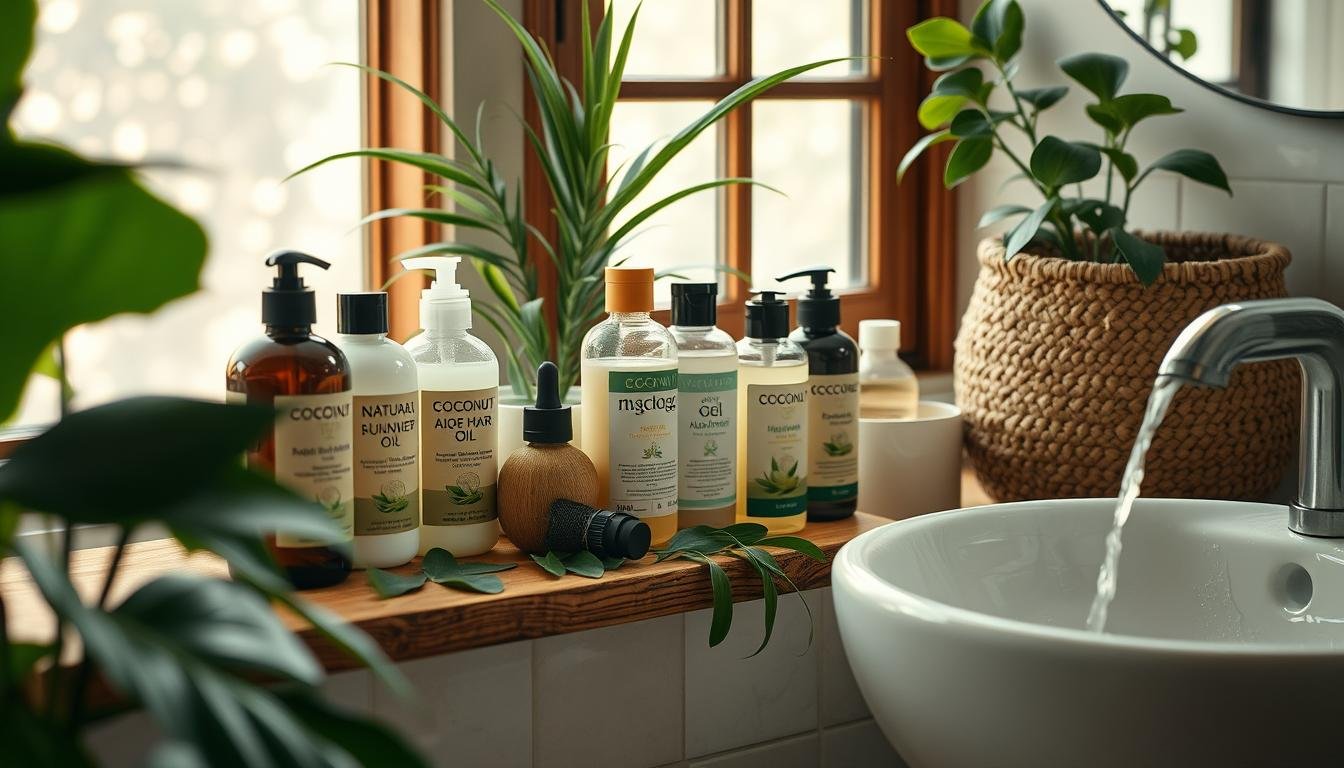Are Natural Products Always Better for Hair? | Hair Care Guide
Surprisingly, 78% of consumers now prefer natural hair care products over synthetic alternatives. This dramatic shift in consumer preference reflects a growing awareness of the potential benefits and drawbacks of natural versus synthetic ingredients in hair care. As the natural Hair Care market continues to surge, it’s essential to understand the nuances of this complex landscape and determine what truly works best for your unique hair type and needs.
Key Takeaways
- Natural Hair Care products are made with gentle, plant-derived ingredients that can nourish and protect hair.
- Synthetic ingredients offer consistency and engineered benefits, but some may carry potential Health risks.
- The effectiveness of hair products depends on formulation, concentration, and ingredient compatibility.
- Consumers are seeking natural hair care options that are both effective and safe.
- Understanding your unique hair type and needs is crucial in selecting the right natural or synthetic products.
Understanding Hair Types and Needs
Navigating the world of hair care can be a daunting task, as our locks come in a variety of types and textures. Understanding the unique characteristics of your hair is the first step towards achieving a healthy, vibrant mane. From straight and fine to curly and coarse, each hair type requires specialized care to maintain its optimal condition.
Different Hair Types and Their Characteristics
Hair types are primarily categorized by their curl pattern, with four main types: straight (Type 1), wavy (Type 2), curly (Type 3), and coily (Type 4). Within each of these types, there are subcategories (A, B, and C) that denote the tightness or looseness of the curls. Straight hair, for instance, may be prone to oiliness and require lightweight products, while curly and coily hair types thrive on heavy-duty moisture and nourishment.
- Straight hair (Type 1): Prone to oiliness, may not require heavy serums; texture sprays and dry shampoos are recommended.
- Wavy hair (Type 2): Requires products that boost wave definition and prevent frizz, such as mousses, gels, and diffusers.
- Curly hair (Type 3): Needs specialized care to avoid Damage, maintain moisture, and define natural curls; air-drying and using specific products are suggested.
- Coily hair (Type 4): Delicate and requires extra moisture; recommendations include deep conditioning masques, butters, creams, and gentle handling.
Importance of Hair Health Assessment
Assessing the overall Health and condition of your hair is crucial in determining the right hair care routine. Factors such as hair density, porosity, and scalp health all play a significant role in the effectiveness of your products and techniques. By understanding your unique hair profile, you can tailor your regimen to address specific needs and achieve optimal results.
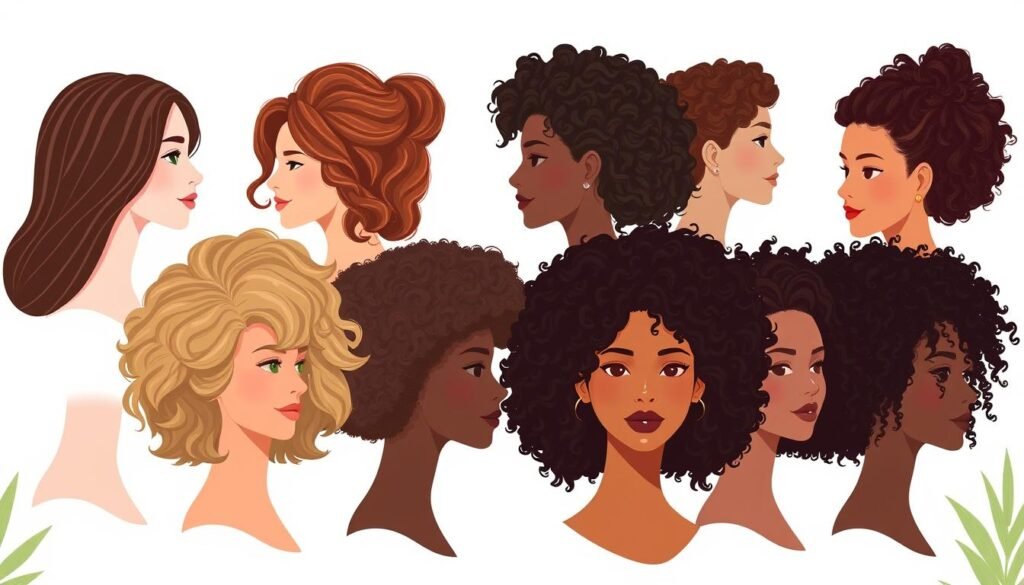
Remember, the key to healthy, vibrant hair lies in identifying your hair’s unique characteristics and implementing a tailored care routine. By embracing your hair type and catering to its specific needs, you can unlock your locks’ full potential and enjoy a confident, beautiful mane.
The Rise of Natural Hair Care Products
The popularity of natural hair care products has seen a significant rise in recent years, driven by increased consumer awareness about the importance of ingredient safety and environmental impact. As people become more conscious of the potential harm caused by harsh chemicals in traditional hair products, the demand for natural and organic alternatives has surged.
Popular Natural Ingredients for Hair
Natural hair care products often feature a variety of beneficial ingredients that nourish and protect the hair. Some of the most popular natural ingredients include:
- Coconut oil: Known for its moisturizing properties, coconut oil helps to keep hair soft, smooth, and healthy.
- Shea butter: This creamy butter is rich in vitamins and fatty acids, making it an excellent conditioning agent for hair.
- Aloe vera: Aloe vera is a soothing ingredient that can help to calm the scalp and promote healthy hair growth.
- Essential oils: Oils like tea tree, lavender, and rosemary offer a range of benefits, from scalp soothing to hair strengthening.
The Role of Organic Certifications
Organic certifications play a crucial role in the natural hair care industry, ensuring that products adhere to strict standards of quality and sustainability. Products with organic certifications, such as USDA Organic or Ecocert, are typically free from synthetic additives, preservatives, and harsh chemicals, making them a more eco-friendly and health-conscious choice for consumers. However, it’s important to note that not all natural products are certified organic, and regulations can vary across different regions and certifying bodies.
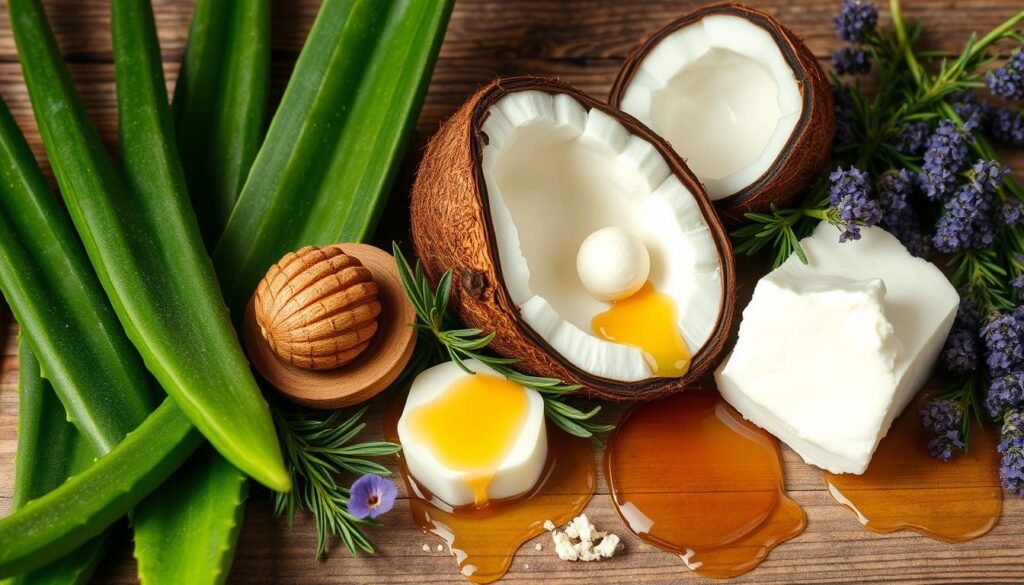
Benefits of Using Natural Products
When it comes to hair care, natural products offer a range of benefits that make them an attractive choice for many consumers. These chemical-free products are formulated with nourishing ingredients that can strengthen, protect, and revitalize your hair without exposing you to potentially harmful synthetics.
Nourishing Properties of Natural Ingredients
Natural hair care products are often infused with vitamins, antioxidants, and fatty acids that work to deeply nourish and condition the hair. Ingredients like coconut oil, aloe vera, and rosemary oil can promote healthier, shinier, and more resilient locks. These natural components can help improve hair growth, reduce breakage, and leave your tresses feeling soft and manageable.
Reduced Risk of Harsh Chemicals
One of the primary advantages of using natural hair care products is the reduced exposure to harsh chemicals such as sulfates, parabens, and phthalates. These synthetic additives can be drying, irritating, and potentially harmful to both your hair and scalp. Natural, chemical-free formulas are gentle and less likely to trigger adverse reactions, making them a safer choice, especially for individuals with sensitive skin or allergies.
In addition, natural hair care products are often more environmentally friendly, as they are made with biodegradable ingredients that do not harm ecosystems. This aligns with the growing consumer demand for eco-conscious, sustainable products.
While the effectiveness of natural hair care products can vary depending on individual hair needs and product formulations, the benefits of nourishing, chemical-free ingredients are undeniable. Incorporating these natural solutions into your hair care routine can be a rewarding way to promote long-term Hair Health and wellbeing.
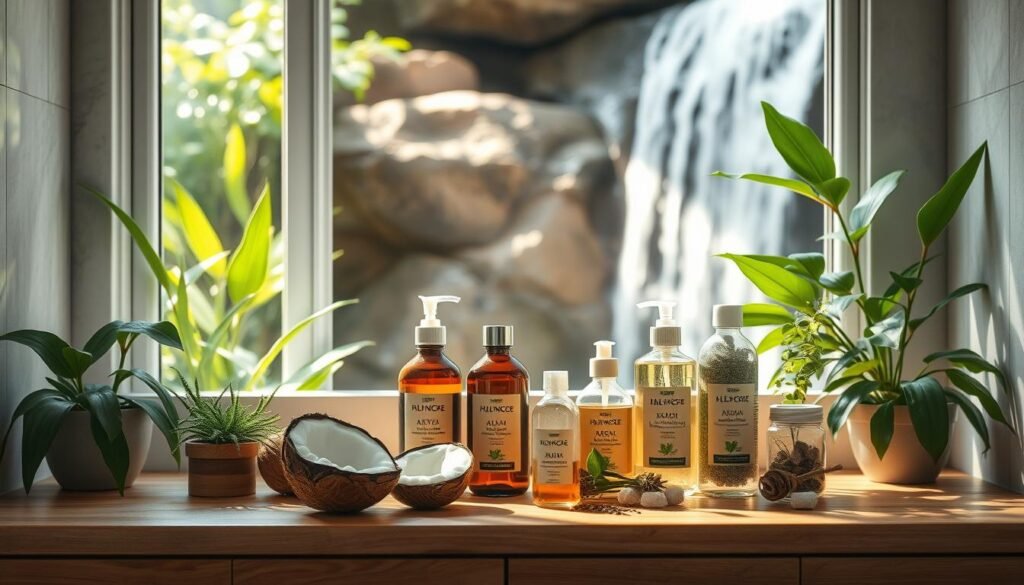
Potential Drawbacks of Natural Products
While natural hair care products offer a more holistic and eco-friendly approach, they are not without their potential drawbacks. One significant concern is the risk of allergic reactions or sensitivities to certain natural ingredients. Many plant-based compounds can trigger allergic responses in some individuals, leading to irritation, redness, or even scalp inflammation. Careful consideration of personal skin and hair sensitivities is crucial when transitioning to natural products.
Another potential drawback of natural hair care products is the variability in their effectiveness across different brands and formulations. Unlike their synthetic counterparts, natural ingredients can be more susceptible to quality inconsistencies, processing methods, and variations in sourcing. This can result in a lack of consistent performance, with some natural products failing to provide the same level of product effectiveness as their conventional alternatives.
| Potential Drawbacks of Natural Hair Care Products | Potential Drawbacks of Synthetic Hair Care Products |
|---|---|
|
|
Additionally, natural hair care products often have a shorter shelf life compared to their synthetic counterparts, as they lack the preservatives that extend the lifespan of conventional products. This can result in a need for more frequent product replenishment and potentially increased costs for consumers.
It’s important to note that the effectiveness of natural products may not be as immediately noticeable as their synthetic equivalents. Natural ingredients often work gradually to nourish and improve the overall health of the hair, rather than providing a quick fix. Patience and consistent use are typically required to see the full benefits of natural hair care products.

Comparing Natural and Synthetic Products
When it comes to hair care, the debate between natural and synthetic products has been ongoing. Both categories offer unique advantages and considerations for consumers. Understanding the performance and accessibility of these two product types can help make informed choices for your hair’s health and well-being.
Performance and Results: A Side-by-Side
Natural hair care products excel in nourishing and rejuvenating the hair, thanks to their rich, plant-based ingredients. These formulas often contain beneficial oils, butters, and extracts that deeply condition and revitalize the hair. In contrast, synthetic products typically offer more precise and consistent results, leveraging engineered compounds to achieve specific outcomes, such as enhanced shine or frizz control.
While natural ingredients may take longer to manifest their full effects, they can provide long-term benefits for hair health. Synthetic products, on the other hand, often have a longer shelf life and can be more cost-effective in the short term.
Cost Factors and Accessibility
Natural hair care products tend to be more expensive due to the labor-intensive process of sourcing and formulating with pure, organic ingredients. However, the potential long-term benefits for hair health may outweigh the initial cost for some consumers. Synthetic products, being mass-produced, are generally more accessible and widely available across various retail channels.
As the demand for natural and sustainable products continues to grow, the accessibility of natural hair care options is steadily increasing. Consumers now have a wider range of natural and organic hair care solutions to choose from, catering to diverse hair types and needs.
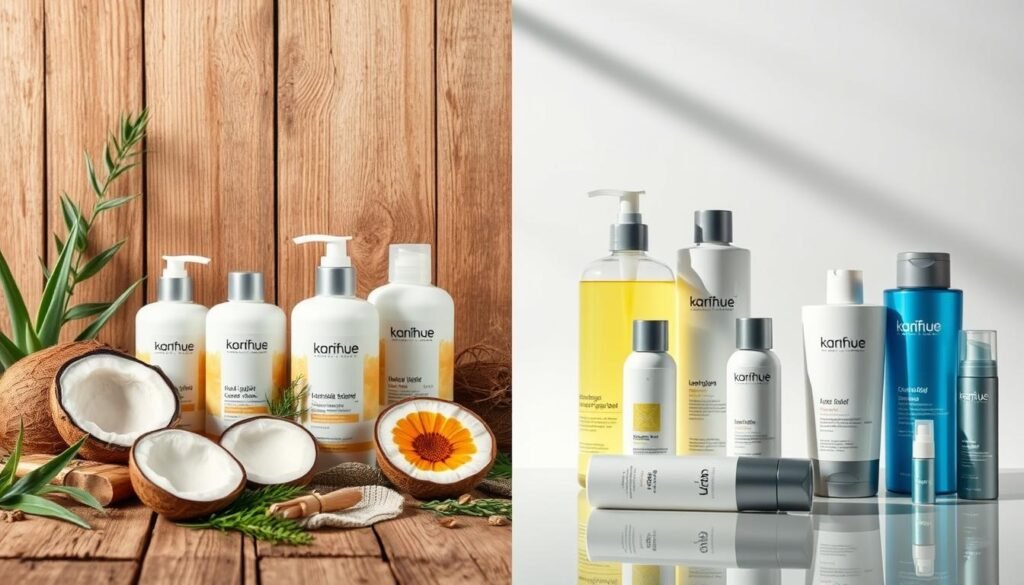
Ultimately, the choice between natural and synthetic hair care products involves striking a balance between personal preferences, hair needs, and budgetary considerations. By understanding the unique strengths and trade-offs of each category, consumers can make informed decisions that align with their hair care goals and overall well-being.
Ingredients to Avoid in Hair Care Products
When it comes to hair care, navigating the sea of synthetic chemicals can be overwhelming. Many mainstream Hair Products contain potentially harmful ingredients that can have adverse effects on our hair and overall health. It’s crucial to be an informed consumer and understand what to look out for when selecting hair care products.
Common Harmful Chemicals in Synthetic Products
Some of the most concerning synthetic chemicals found in hair care products include:
- Sulfates, such as sodium lauryl sulfate (SLS) and sodium laureth sulfate (SLES), which can cause skin and eye irritation, especially for those with sensitive skin.
- Parabens, like methylparaben, propylparaben, butylparaben, and ethylparaben, which have been linked to health risks like skin and breast cancer, reproductive issues, and hormonal imbalance.
- Phthalates, which are used to make products more flexible and long-lasting but have been associated with endocrine disruption, neurotoxicity, and other health concerns.
These synthetic chemicals can not only harm your hair and scalp but also pose potential risks to your overall well-being. Prioritizing natural, gentle ingredients is crucial for maintaining healthy, vibrant hair.
Understanding Ingredient Labels
Deciphering ingredient labels is key to making informed choices. Look for products that are free from the harmful chemicals mentioned above and instead contain nourishing, natural ingredients like aloe vera, coconut oil, shea butter, jojoba oil, and tea tree oil. Be wary of generic terms like “fragrance,” which can sometimes be a catch-all for undisclosed synthetic compounds.
Experimenting with different natural hair care products can help you find the best regimen tailored to your individual hair type and needs. By prioritizing clean, gentle ingredients, you can enjoy the benefits of healthier, more resilient hair.

“Choosing hair care products with clean, natural ingredients is essential for maintaining the health and vitality of your hair. Steer clear of synthetic chemicals that can potentially cause harm.”
The Importance of pH Balance in Hair Products
When it comes to maintaining healthy, vibrant hair, the pH balance of your hair care products plays a crucial role. The ideal pH for hair is slightly acidic, ranging from 4.5 to 5.5. This slightly acidic environment helps keep the hair cuticle closed, preventing frizz and enhancing shine. Unfortunately, many synthetic hair products can disrupt this natural pH balance, leading to potential damage and dryness.
How pH Affects Hair Health
Hair itself naturally has a pH ranging from 3.5 to 4.5, while the scalp’s natural pH is approximately 5.5, slightly more basic (alkaline) than hair. Products that maintain a pH level of 6.0 for shampoo and 4.5 for conditioner contribute to optimal hair health. A study in the International Journal of Trichology in 2014 indicates that an alkaline pH increases the negative electrical charge of the hair fiber surface, leading to more friction between the fibers, which can cause tangling and frizz.
Natural vs. Synthetic pH Levels
Natural hair care products often have pH levels closer to the hair’s natural balance, while some synthetic products may disrupt this delicate pH. For example, the MONPURE Strengthening Silk Protein Shampoo maintains a pH level of 6.0, while the Strengthening Essence-Conditioner maintains a pH level of 4.5, helping to nourish and protect the hair. In contrast, hair dyes, bleaching treatments, and certain styling products can have much higher pH levels, potentially causing damage if not properly balanced.
Maintaining the right pH balance in your hair care routine is crucial for keeping your locks healthy, strong, and vibrant. By choosing products that align with your hair’s natural pH, you can help prevent frizz, retain moisture, and enhance the overall condition of your hair.
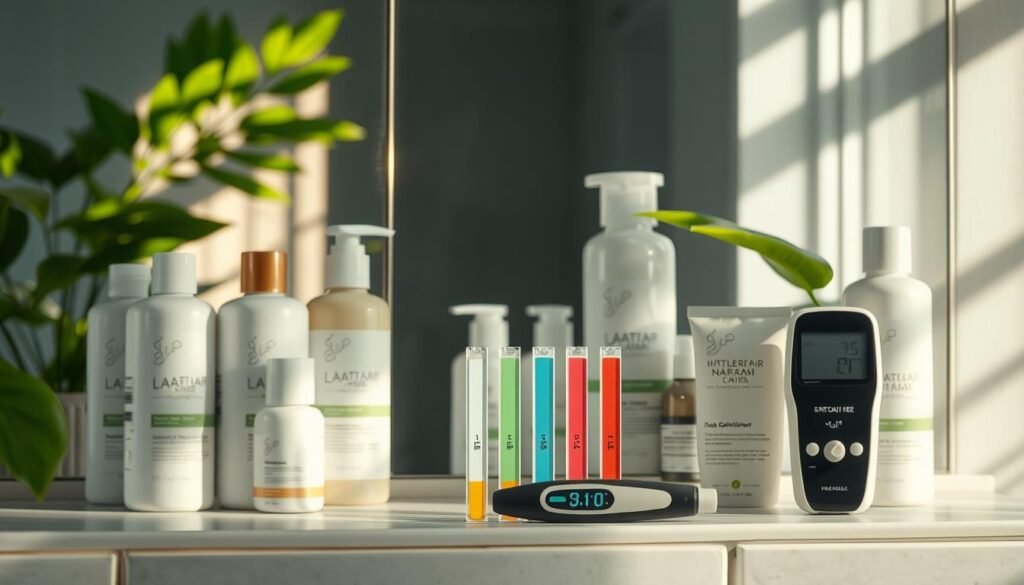
Consumer Trends in Hair Care
The hair care industry is undergoing a significant transformation, as consumers increasingly prioritize eco-friendly and natural products. This shift is driven by a growing awareness of environmental issues and personal health concerns. Social media platforms have played a crucial role in shaping consumer preferences, with influencers and beauty experts often promoting natural and organic hair care options.
The Shift Towards Eco-Friendly Products
The demand for eco-friendly hair care products has surged in recent years. According to industry data, natural products are responsible for driving 21% of beauty’s growth, despite only constituting an 8% industry share. This trend is fueled by consumers’ desire for sustainable and ethically sourced ingredients, as well as a preference for plastic-free and refillable packaging options.
Influences of Social Media on Hair Care Choices
Social media influence has become a significant factor in consumers’ hair care decisions. Beauty influencers and social media personalities often showcase the benefits of natural hair care products, leading to increased awareness and adoption among their followers. This trend is particularly prevalent among younger generations, with 52% of millennials and Gen Z being aware of third-party certifications like EWG VERIFIED, which help identify safer products.
The industry is also witnessing a shift towards inclusive marketing, catering to diverse demographics based on gender, race, age, socio-economics, and skin type. This approach has resonated with consumers, who are increasingly seeking brands that align with their values and address their unique needs.
| Trend | Percentage Increase |
|---|---|
| Certified B Corp products in hair care | 41.5% |
| Aluminum-free hair care products | 29.7% |
| Organic hair care products | 20.7% |
These statistics demonstrate the growing consumer demand for eco-friendly hair care, which is further amplified by the influence of social media and consumer trends. As the industry continues to evolve, brands that can effectively cater to these shifting preferences are poised to thrive in the rapidly changing hair care market.
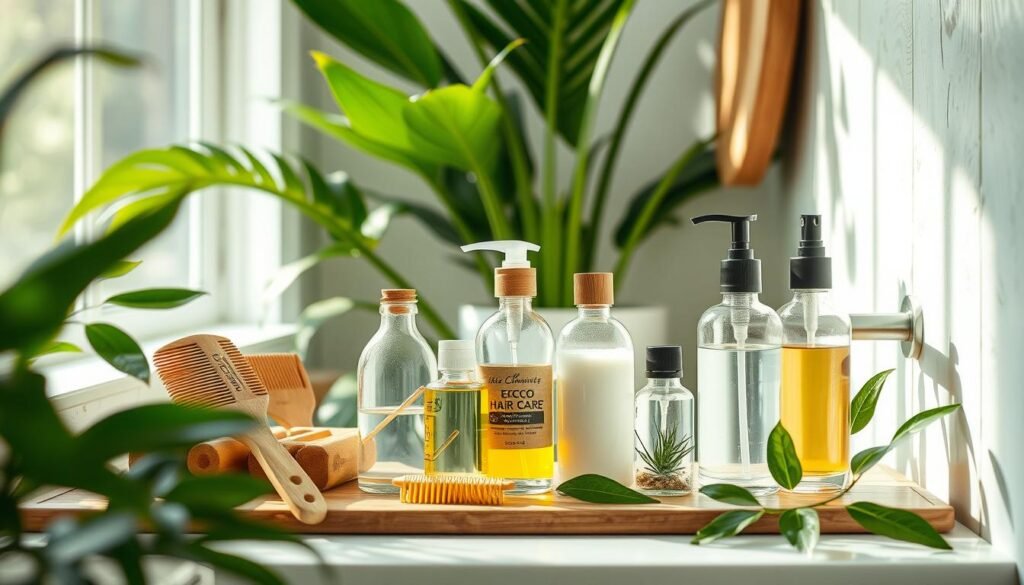
Expert Opinions on Hair Care Routines
When it comes to achieving healthy, beautiful hair, both hair care experts and medical professionals offer valuable insights. Hair stylists and dermatologists often emphasize the importance of customized hair care routines that cater to individual hair needs, rather than a one-size-fits-all approach.
Dermatologists on Natural vs. Synthetic
Dermatologists frequently stress the significance of focusing on specific hair concerns and selecting products with ingredients that address those issues, rather than simply choosing natural or synthetic options. They acknowledge that both natural and synthetic products can be effective, depending on the individual’s hair type and condition. The key, according to dermatologists, is understanding the unique needs of one’s hair and selecting products accordingly.
Hair Stylists’ Recommendations
Hair stylists often recommend a combination of natural and synthetic products for optimal hair care results. They take into account factors such as hair type, texture, and styling needs when making product recommendations. Stylists emphasize the importance of proper application techniques and consistent hair care routines to maintain healthy, vibrant hair.
Both hair care experts and dermatologists agree that maintaining a healthy hair care routine is crucial for overall hair health and appearance. By understanding one’s individual hair needs and seeking personalized advice, individuals can make informed choices and achieve their desired hair goals.
| Hair Care Experts | Recommendations |
|---|---|
| Dermatologists | Focus on specific hair concerns and select products with targeted ingredients, regardless of natural or synthetic origins. |
| Hair Stylists | Recommend a combination of natural and synthetic products based on hair type, texture, and styling needs. Emphasize proper application and consistent routines. |

“Achieving healthy, vibrant hair is not about natural or synthetic products, but rather understanding your individual hair needs and selecting the right ingredients to address them.”
Making Informed Choices for Hair Care
Achieving healthy, vibrant hair requires a thoughtful approach to hair care. The first step in making informed choices is to evaluate your unique hair needs. Consider factors like your hair type, texture, moisture level, and any specific concerns such as dryness, damage, or scalp issues. Understanding your hair’s characteristics will help you identify the right products and ingredients to address your unique needs.
Evaluating Your Hair Needs
Take the time to assess your hair’s condition and identify any areas that need attention. Observe the texture, whether it’s fine, coarse, or somewhere in between. Determine if your hair is generally dry, oily, or balanced in terms of moisture. Inspect your scalp for any signs of irritation, flakiness, or excess oil production. Noting these details will Guide you towards the most suitable hair care solutions.
Tips for Experimenting with New Products
When introducing new hair care products, it’s essential to incorporate them gradually. Avoid abruptly switching your entire routine, as your hair and scalp may need time to adjust to different formulations. Start by replacing one product at a time, such as your shampoo or conditioner, and monitor the results before making additional changes. Be patient, as natural and organic products may take longer to reveal their full benefits compared to synthetic alternatives. Carefully read labels to ensure the products align with your hair care goals and avoid any potentially harmful ingredients.
Consulting with hair care professionals, such as your stylist or a dermatologist, can also provide invaluable insights and personalized recommendations. Their expertise can help you navigate the vast array of hair care options and find the right balance of natural and synthetic products for your specific needs. By making informed choices and embracing a holistic approach to hair care, you can achieve the healthy, vibrant locks you desire.
FAQ
Are natural products always better for hair?
The effectiveness of hair care products depends on formulation, concentration, and how ingredients work together. Both natural and synthetic products have their own strengths and benefits. The debate between natural and synthetic ingredients is ongoing, with both having pros and cons.
What are the different hair types and their characteristics?
Hair types include oily, dry, fine, and color-treated. Each type requires specific care and ingredients. Oily hair benefits from tea tree oil and peppermint oil, while dry hair needs coconut oil and argan oil. Sensitive hair should use gentle ingredients like aloe vera and chamomile. Fine hair can benefit from rosemary and lavender essential oils. Assessing hair health is crucial for choosing appropriate products and creating an effective hair care routine.
What are the popular natural ingredients used in hair care products?
Popular natural ingredients include coconut oil, shea butter, aloe vera, and essential oils. These ingredients offer various benefits such as moisturizing, strengthening, and soothing properties. Organic certifications play a role in ensuring product quality and adherence to natural and sustainable practices.
What are the benefits of using natural hair care products?
Natural hair care products offer nourishing properties from ingredients rich in vitamins, antioxidants, and fatty acids. They can strengthen and protect hair while being gentler on the scalp. Using natural products reduces exposure to potentially harmful chemicals like sulfates and parabens. Natural ingredients are often more environmentally friendly and biodegradable.
What are the potential drawbacks of natural hair care products?
Natural products can have drawbacks, including potential allergic reactions to certain plant-based ingredients. The effectiveness of natural products can vary across brands due to differences in formulation and ingredient quality. Natural products often have a shorter shelf life due to the lack of synthetic preservatives. Some natural ingredients may not provide the same immediate results as their synthetic counterparts, requiring patience and consistent use for noticeable effects.
How do natural and synthetic hair care products compare?
Natural and synthetic products have different strengths. Natural ingredients excel in nourishing and rejuvenating hair, while synthetic ingredients offer precise outcomes and consistent performance. Synthetic products often have a longer shelf life and can be more cost-effective. Natural products may be more expensive but offer potential long-term benefits for hair health. Accessibility varies, with synthetic products generally being more widely available, though natural options are increasing in the market.
What are some common harmful ingredients to avoid in hair care products?
Common harmful ingredients in synthetic products include sulfates, parabens, and phthalates. These can cause scalp irritation, disrupt hormonal balance, and potentially harm the environment. Understanding ingredient labels is crucial for making informed choices. Look for products free from these harmful chemicals and prioritize natural, nourishing ingredients.
Why is pH balance important for hair care?
pH balance is crucial for maintaining healthy hair and scalp. The ideal pH for hair is slightly acidic, around 4.5-5.5. Natural products often have pH levels closer to hair’s natural pH, while some synthetic products may disrupt this balance. Using products with appropriate pH levels can help maintain hair cuticle health, prevent frizz, and enhance shine.
What are the current consumer trends in hair care?
Consumer trends show a significant shift towards eco-friendly and natural hair care products. This shift is driven by increased awareness of environmental issues and personal health concerns. Social media plays a crucial role in shaping hair care choices, with influencers and beauty gurus often promoting natural and organic products.
What do experts recommend for effective hair care routines?
Dermatologists often emphasize the importance of individual hair needs over blanket recommendations for natural or synthetic products. They suggest focusing on ingredients that address specific hair concerns. Hair stylists often recommend a combination of natural and synthetic products for optimal results, considering factors like hair type, texture, and styling needs.
How can I make informed choices for my hair care?
Making informed choices involves understanding your hair type, concerns, and goals. Evaluate your hair’s texture, moisture level, and any specific issues like dandruff or damage. When experimenting with new products, introduce them one at a time to assess their impact. Be patient, as natural products may take longer to show results. Read labels carefully and consider consulting with hair care professionals for personalized advice.
